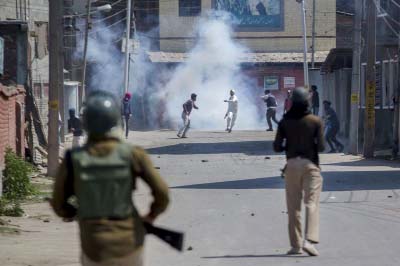
AP, Srinagar :
Deadly protests against Indian rule erupted in several parts of Indian-controlled Kashmir on Sunday following the killings of at least eight rebels in fighting with government forces, officials said.
The new round of anti-India protests and clashes, leading to the killing of at least one civilian, has come as Indian troops launched deadly counterinsurgency operations targeting mainly the southern parts of Kashmir where new-age rebels have revived militancy and challenged New Delhi’s rule with guns and effective use of social media.
The gunbattles in southern Kashmir began overnight after government forces raided two villages following a tip that rebels were hiding there and came under fire, police said.
Police said the militants tried to escape from a security cordon while firing their guns and grenades but were killed in the ensuing fighting. Seven militants, including some commanders, were killed in the Shopian area, while one rebel was killed and another captured in Anantnag early Sunday, said top police officer S.P. Vaid. Police said a third gunbattle also erupted in Shopian, where several rebels were trapped. No rebel group fighting against Indian rule immediately issued any statement about Sunday’s fighting.
As the fighting raged, anti-India protests erupted in several villages in southern Kashmir in solidarity with the rebels.
Many protesters also tried to march to the gunbattle sites to help the trapped militants escape, leading to clashes between rock-throwing residents and government forces who fired live ammunition, shotgun pellets and tear gas.
According to hospital officials and police, one civilian was killed and at least three dozen others injured in the ongoing clashes.
Some injured were shifted to hospitals in the region’s main city of Srinagar.
Authorities cut cellphone internet services in the most restive towns, and reduced connection speeds in other parts of the Kashmir Valley, a common government practice aimed to calm tensions and prevent anti-India demonstrations from being organized. They also ordered curfews in some southern areas.
Several protests and clashes also erupted in Srinagar and other parts of Kashmir.
In recent years, Kashmiris, mainly youths, have displayed open solidarity with anti-India rebels and sought to protect them by engaging troops in street clashes during military operations against the militants.
The anti-India protests and clashes have persisted despite the Indian army chief warning recently that tough action would be taken against stone throwers during counterinsurgency operations.
Separatist leaders who challenge India’s sovereignty over Kashmir have called for a shutdown on Monday against the killings.
Nuclear-armed India and Pakistan each administer part of Kashmir, but both claim it in its entirety.
Anti-India sentiment runs deep in Kashmir, which in recent years has seen renewed rebel attacks and repeated public protests against Indian rule.
Rebels have been fighting Indian rule since 1989, demanding Kashmir be made part of Pakistan or become an independent country. India accuses Pakistan of arming and training the rebels, a charge Pakistan denies.
Most Kashmiris support the rebels’ cause against Indian rule while also participating in civilian street protests against Indian control.
Deadly protests against Indian rule erupted in several parts of Indian-controlled Kashmir on Sunday following the killings of at least eight rebels in fighting with government forces, officials said.
The new round of anti-India protests and clashes, leading to the killing of at least one civilian, has come as Indian troops launched deadly counterinsurgency operations targeting mainly the southern parts of Kashmir where new-age rebels have revived militancy and challenged New Delhi’s rule with guns and effective use of social media.
The gunbattles in southern Kashmir began overnight after government forces raided two villages following a tip that rebels were hiding there and came under fire, police said.
Police said the militants tried to escape from a security cordon while firing their guns and grenades but were killed in the ensuing fighting. Seven militants, including some commanders, were killed in the Shopian area, while one rebel was killed and another captured in Anantnag early Sunday, said top police officer S.P. Vaid. Police said a third gunbattle also erupted in Shopian, where several rebels were trapped. No rebel group fighting against Indian rule immediately issued any statement about Sunday’s fighting.
As the fighting raged, anti-India protests erupted in several villages in southern Kashmir in solidarity with the rebels.
Many protesters also tried to march to the gunbattle sites to help the trapped militants escape, leading to clashes between rock-throwing residents and government forces who fired live ammunition, shotgun pellets and tear gas.
According to hospital officials and police, one civilian was killed and at least three dozen others injured in the ongoing clashes.
Some injured were shifted to hospitals in the region’s main city of Srinagar.
Authorities cut cellphone internet services in the most restive towns, and reduced connection speeds in other parts of the Kashmir Valley, a common government practice aimed to calm tensions and prevent anti-India demonstrations from being organized. They also ordered curfews in some southern areas.
Several protests and clashes also erupted in Srinagar and other parts of Kashmir.
In recent years, Kashmiris, mainly youths, have displayed open solidarity with anti-India rebels and sought to protect them by engaging troops in street clashes during military operations against the militants.
The anti-India protests and clashes have persisted despite the Indian army chief warning recently that tough action would be taken against stone throwers during counterinsurgency operations.
Separatist leaders who challenge India’s sovereignty over Kashmir have called for a shutdown on Monday against the killings.
Nuclear-armed India and Pakistan each administer part of Kashmir, but both claim it in its entirety.
Anti-India sentiment runs deep in Kashmir, which in recent years has seen renewed rebel attacks and repeated public protests against Indian rule.
Rebels have been fighting Indian rule since 1989, demanding Kashmir be made part of Pakistan or become an independent country. India accuses Pakistan of arming and training the rebels, a charge Pakistan denies.
Most Kashmiris support the rebels’ cause against Indian rule while also participating in civilian street protests against Indian control.

